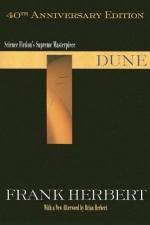|
This section contains 335 words (approx. 2 pages at 300 words per page) |

|
Dune is an excellent example of how an author may solve the potential conflict between a novel of "ideas" and an entertaining narrative. Paul is a nearperfect hero because he is a good charismatic leader who can foresee the results of his actions, which advances Herbert's principal theme of destruction. However, a character's ability to know the future presents significant problems for maintaining suspense. If a character can see into the future, then both he and the reader will know everything that will follow and there is no suspense. Often, a writer will solve the problem by having the future-seeing character foresee a terrible doom; tension is then created by the struggle against that impending doom. Sometimes the struggle is complicated by characters who refuse to believe the prophesies. This happens to Cassandra in Homer's Iliad, where it has great ironic power; that is, readers know something most...
|
This section contains 335 words (approx. 2 pages at 300 words per page) |

|




